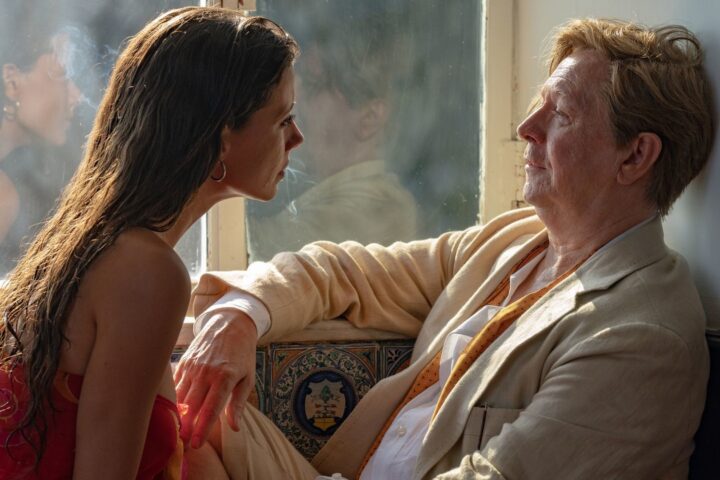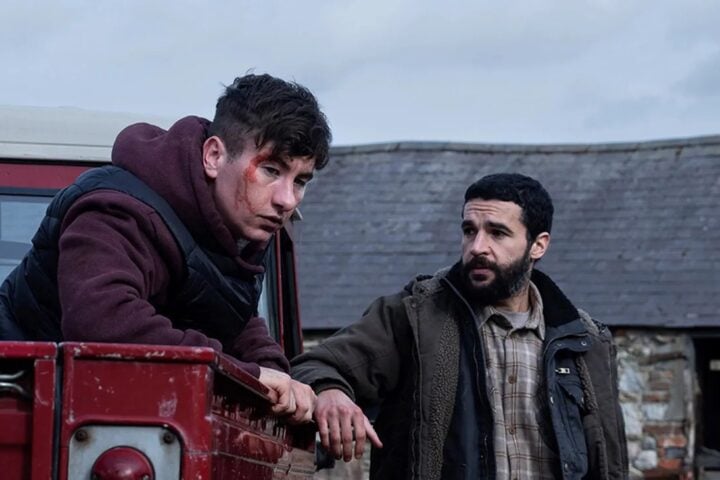“The longer it goes on, the less the world will care about it” says Mstyslav Chernov, director of 2023’s Oscar-winning 20 Days of Mariupol, late in his new documentary, 2000 Meters to Andriivka. His frustration and despair is indicative of the almost nonstop barrage of bullets, grenades, and drone strikes that head his way as he closely follows a small battalion of Ukrainian soldiers while they try to inch their way closer to the town of Andriivka. As the title suggests, it’s a mere 2,000 meters away, but even after months of trying, the soldiers have gained little ground in an ongoing battle of trench warfare that’s more reminiscent of the Battle of Verdun in World War I than a modern tactical battle.
Along with using his own camera, Chernov outfits a number of soldiers with GoPro helmet-cams that capture the ceaseless onslaught of Russian enemies with an urgency and physical tactility that often matches the harrowing footage of his previous film. Dirt flies at the screen from stray bullets, dead bodies are glimpsed with the turn of a head, and the pervasive sense of a mostly unseen enemy overwhelming the soldiers nearly every step of the way can be felt in every frame.
This shooting style recalls the look of a Call of Duty game. Yet where those games tend to transform the battleground into a heroic space, 2000 Meters to Andriivka leaves viewers trapped inside the desperate soldiers’ headspaces, suggesting an ongoing nightmare from which there’s no release. All the while, Sam Slater’s low, rumbling drone score underlines the dire conditions endured by these men who are essentially in a war for survival.
At one point, two soldiers discuss how they had no intention of becoming soldiers, with one making the important distinction that he “came to fight not serve.” And it’s through the often mundane chatter that the men engage in between skirmishes that Chernov’s film finds its humanity. Beyond the intense, horrific violence on display, we become privy to the men’s utter ordinariness—their fears, dreams, and, above all, existential need to see an end to a war that began with some hope and turned only into a gradual slaughter with no end in sight.
At another point, a soldier admits that he finally understands how his wife worries about him, as he’s allowed himself to get into the headspace of worrying about her as well, before then pondering the plumbing in his home that he would like to fix. Such interjections of quotidian reflection give a fullness and emotional resonance to a film that can, at times, be borderline oppressive in its depiction of war’s brutality, and to the point of numbing. But that’s part and parcel of Chernov’s project here. The combat and bloodshed takes on a darkly absurd quality as occasional title markers inform us that, presumably after weeks, or even months, the soldiers are only a few hundred meters closer to their goal, all while Andriivka is further blown to bits.
This adds to the aura of futility coursing through 2000 Meters to Andriivka, but amid the destruction, Chernov captures his subjects sharing moments of camaraderie and compassion. A flame of humanity remains lit throughout, even as we learn that many of the men we’ve been following have since been killed in action. In the most gentle, touching sequence in the film, a stray cat enters a foxhole to commune with soldiers who’ve taken cover there. As they comfort their little visitor before zipping it up in a bag in order to carry it off to safety, one gets the truest sense of the men’s mission. More than helping to aid in Ukraine’s survival and independence, they are driven above all by their steadfast need to retain their basic humanity.
Since 2001, we've brought you uncompromising, candid takes on the world of film, music, television, video games, theater, and more. Independently owned and operated publications like Slant have been hit hard in recent years, but we’re committed to keeping our content free and accessible—meaning no paywalls or fees.
If you like what we do, please consider subscribing to our Patreon or making a donation.




